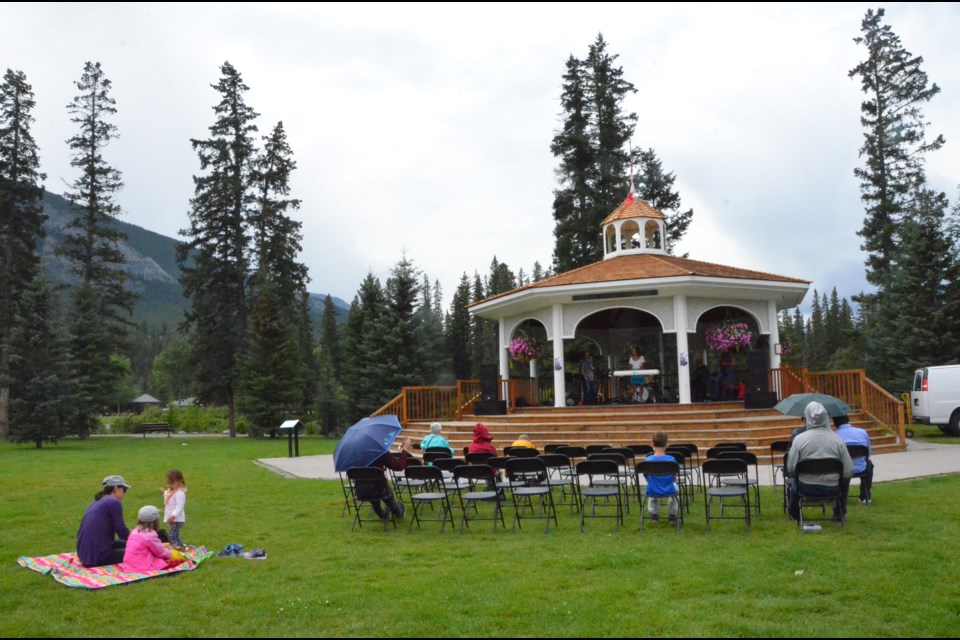“Who doesn't like a concert in the park? Nobody does these anymore,” said Jon Frolick from behind his drums on the Banff gazebo stand.
Every summer, he performs here with his band Suzie Q in honour of his late mentor, Louis Trono (1909-2004), the local music legend initiated the tradition in the 1960s.
This Sunday (Aug. 11), in between raindrops and oldies from Doris Day and Patsy Cline, Frolick shared stories about the trombonist and his Little Big Band, with whom he played for the last decade of Trono's career. In the end, although he could not blow his horn anymore after a career spanning close to 80 years anymore, Trono would still lead the band for the annual event.
“Two weeks before he passed away in May 2004, I visited him at St Martha's Place,” Frolick said.
At 95, reclining in his Lazy Boy in the nursing home lobby, Trono dictated to Frolick the song list for the upcoming summer concert.
“At some point, he pulled me close and said, ‘Tell the boys to play Sentimental Journey at my funeral.’ And so they did – from behind the altar of St Mary's Catholic Church, to the standing ovation of an overflowing crowd.
“We carried on our jam session at the Banff Springs Hotel, where Ted Kissane, the Fairmont manager, organized a white linen service reception in his honour.”
Such was the status of the local musician.
“He was treated like royalty,” Frolick said. “People at the hotel were asking him for his autograph all the time.”
Trono's career was indeed interwoven with the Fairmont Banff Springs Hotel's history. He played there on and off for 60 years, thereby fulfilling his childhood dream and coming full circle to his old stomping ground.
“He was a home-grown boy who got the itch for music early on, and was able to realise his dream,” Frolick said.
Today, the Banff Central Park gazebo bears his name, and a nearby sign panel shares his inspiring story.
The son of Italian immigrants, Trono was born in 1909 in Bankhead, a coal-mining settlement nestled between Cascade Mountain and Lake Minnewanka, a stone's throw from Banff.
Music was a family affair. He learned to play the guitar and the mandolin by ear with his dad and uncles, who took him to the town's band practice. In 1922, at age 13, he landed his first job as a caddy at the Banff Springs golf course, which provided the funds to buy his first trombone the following summer.
While playing at the Cascade Dance Hall and the Lux Theatre, he worked as a busboy in the grand hotel, thus listening to the big bands and learning their tunes, even sometimes getting to sit in in the orchestras.
Despite having no formal training, he learned from the greats. In 1932, he moved to Calgary with fellow Banff saxophonist Jerry Fuller, scraping by as a full-time musician.
“Gee, things were really tight back then,” he reminisced in The Albertanin 1978. “I remember we played over a Calgary radio station for half an hour a day and were each paid 85 cents a show. Then that was cut down to 50 cents a day.”
After the rough times many experienced during the Depression, the Jerry Fuller Orchestra eventually made it big in the 1930s, becoming regulars at the Palliser, another CPR hotel in Calgary, where they were picked up by the CBC for Saturday night TransCanada Broadcasts. In the summertime, the band would play the Banff Springs and Chateau Lake Louise.
The band broke up with the start of Second World War. Trono rallied the Navy Band, based in England and Ireland, fortunate enough to watch “the action from the bandstand only” in his own words. After the war, he was discharged in Vancouver, and resumed his ballroom music gigs, playing with Dal Richards on the Panorama Roof, and even with the Vancouver Symphony.
But the music scene was changing. Big Bands were folding down. So Trono moved back to Banff, with his ageing father, and got a day job with Parks Canada. He also got married, becoming a father in his 50s, which often made him joke that he was the only one in the Bow Valley who received both the pension and the children allowance from the government.
But for Banffites, he remained the popular “music man.” He played on weekends and for special engagements, and he eventually found his way back to the Banff Springs Hotel.
“He was such a showman,” said his son Mario Trono, who would regularly attend the dinner and dance at the hotel. “He would always turn the evening into a party. He grabbed the mic and walked to the tables, being personal and asking questions. He was so charming, he could warm up any crowd.”
When tourists had gone back to their native Japan, or Australia, they would send him letters of appreciation.
"I did pretty good, I was pretty happy,” he would say in interviews, modest, always downplaying his musical talent.
For Mario, his father represented an alternative storyline to the mountaineering-centric Banff.
“His geniality connected all the different layers of the city,” Mario said.
From the pioneer days, the mining blue collar past, the glamour of the castles in the Rockies where the bandleader rubbed elbows with prominent guests such as Benny Goodman or Henry Fonda, to the local Legion and the urban lure of swing music.
The sprightly petite Italian could bring it all back to life through colourful anecdotes. No matter what the topic, person or local landmark, Trono had a story to tell.
Eventually, those memories came to fuel a column that he started writing in his 80s for the Crag and Canyon.
Called Sentimental Journey, by the name of his favourite song, the stories conjure up a different era in Banff.
For many, including Frolick, it is a legacy worth celebrating with an annual summer afternoon concert in the park.




